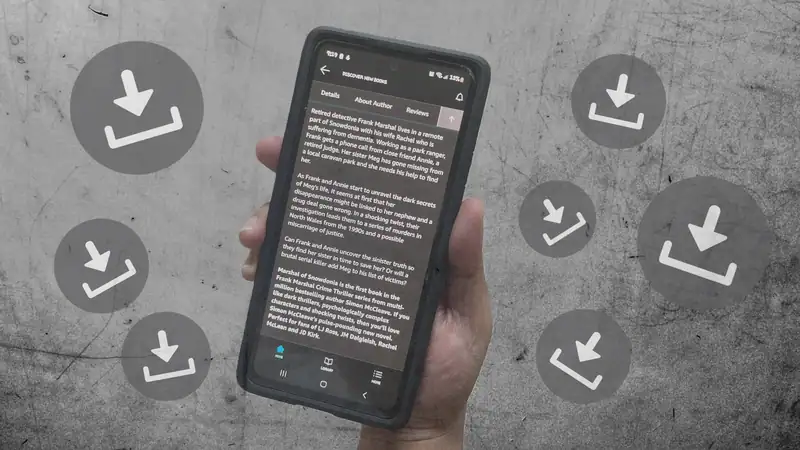Amazon Kindle Will Disable Downloading of Purchased Ebooks

Imagine spending years buying your books, only to discover that you’re renting them forever. That’s exactly how it feels for Amazon Kindle users right now. This week, a couple of YouTubers are in a frenzy, and for a good reason: Amazon announced a change that takes away their rights to their digital libraries. Starting February 26, Kindle users will lose the ability to download e-books to their devices — a feature that has been present for over a decade. A notification about this change is displayed on the download feature page.

Despite this notice, the company doesn’t mention the removal of the feature in its main Digital Content management interface. This might shock users who use the Kindle reader or the Kindle app to read Kindle e-books, who might not notice this feature going away.

The Importance of the Download Feature for Kindle Users
Amazon allows users to purchase e-books accessed through the Kindle app or a Kindle device. One key feature, “download and transfer via USB,” allowed users to download their e-books to a computer and then transfer them to their Kindle devices, especially for devices without internet connectivity, such as Kindle 1, Kindle 2, and Kindle DX. The “download and transfer via USB” feature has been available since the early days of the Kindle, making it easier for users to access their e-books [1].
Another advantage of this feature is the secure storage of e-books. Downloaded e-books can now be saved and backed up on any device, giving readers control over their purchased e-books. This feature is especially useful for readers who use other e-book readers to read their purchased e-books. When downloading e-books from Amazon’s website, they are saved in the older AZW3 format, which was designed for older Kindle models. While these files have Digital Rights Management (DRM) locks, they can be easily removed using various software tools. In contrast, modern Kindle models use the KFX format, which was launched in 2015 and offers enhanced visuals and layout capabilities. However, they also use more advanced DRM measures, making it harder to bypass [2].
The Reading Community’s Response to Amazon’s Decision
I first stumbled across this issue while watching a video by Jared Henderson. He explained that buying a Kindle book is like buying a license to read it—much like borrowing a book on a long-term loan from a library. He believes in the traditional definition of ownership, where if he purchases something, he should have the right to keep it. He was disappointed by Amazon’s move as most authors feel they must sell their books exclusively on Amazon. Unfortunately, Amazon is one of the companies that doesn’t give its users the right to own the books they purchase [3].
Another BookTuber, CriminOlly, echoed similar sentiments while informing his viewers about this change. He pointed out that, although this shift might seem insignificant at first glance, it represents a troubling loss of ownership rights for consumers. CriminOlly also highlighted another instance of how Amazon controlled users’ digital libraries by removing books when those titles were not available in the Kindle store. He theorized that this change gives Amazon full control over their users’ digital libraries, as accessing their books requires being logged into an Amazon account. This change removes the freedom of readers to control the books they bought and paid for [4].
Why This Matters: Your Digital Book Rights at Risk
When you purchase a physical book, you can lend, store, or even resell the book. With proper care, your books can last a lifetime and be passed down to future generations. However, these fundamental consumer rights are gradually being eroded in the digital world. The nature of digital content, as a licensed use rather than ownership, means that these rights can be revoked by the rights holders or the content providers themselves. For example, back in 2019, Amazon removed George Orwell’s “1984” from Kindle users’ catalogs. Jeff Bezos, the CEO of Amazon at the time, removed these books because the publisher MobileReference had no rights to distribute copies of Orwell’s work. Fortunately, Amazon refunded its users as compensation for removing the book.
Another way companies control people’s online libraries is by editing the contents of the books they bought and paid for. Roald Dahl’s books were an infamous case of this censorship by editing their contents to remove any language related to weight, mental health, violence, gender, and race. This decision sparked significant controversy, as it changed the language of the books that reflected the political and social context of their time. These modifications are also concerning since they can shift the meaning of sentences, leading to interpretations that differ from the author’s original message.

And with the removal of the download feature, Kindle users might lose access to more of their digital collection. This change means that users need an Internet connection to read their books. This situation is inconvenient for those who prefer reading their books on the go, as they may not always be online. This change also hurts users of older Kindle models, such as Kindle 1, Kindle 2, and Kindle DX, as they can no longer download purchased Kindle books wirelessly in most areas. Thus, these models are obsolete for reading newly purchased books. Additionally, users will no longer have the option to download Kindle books to their computers for manual transfer. However, this change does not affect books that have already been downloaded [1].
What This Change Means for Your Library
If you haven’t already, I recommend that you download all of your purchased Kindle e-books to your computer before February 26, 2025. Once the download feature goes away, you can still transfer e-book files to your Kindle via USB using Amazon’s applications or third-party software like Calibre.
It is also advisable to consider other alternative e-reader apps. One such app is Kobo, which Jared Henderson highly recommends. Another option is to go back to buying physical books. They tend to have a longer lifespan than digital copies, which can be altered by content providers.
References
[1] https://wiki.rossmanngroup.com/index.php?title=Amazon_Kindle_removes_download_feature_of_purchased_books
[2] https://www.theverge.com/news/612898/amazon-removing-kindle-book-download-transfer-usb
[3] https://www.youtube.com/watch?v=iK1ZZInYRHY
[4] https://www.youtube.com/watch?v=KMoCzeGnIss
[5] https://www.zdnet.com/article/download-your-kindle-books-right-now-amazon-is-killing-this-option-in-a-few-days/
[6] https://www.telegraph.co.uk/news/2023/02/17/roald-dahl-books-rewritten-offensive-matilda-witches-twits/#matilda
